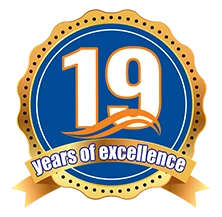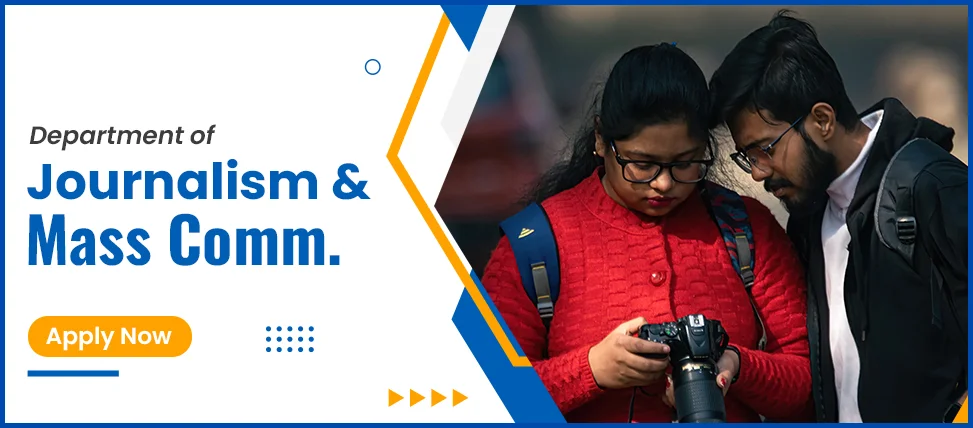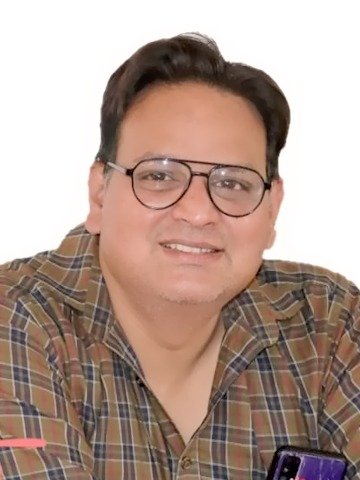About the Department
The Department of Journalism and Mass Communication at Mangalayatan University offers ample of opportunities to students to gain practical work experience through industry oriented curriculum, internships, Industrial visits, and placements in a prominent media organizations and also interaction with leading professionals. We provide propitious environment to the students to produce high-quality project works to match professional standards and goals. We provide students the practical exposure right from the beginning so that the students can build confidence enhance their personality and make a journalistic approach towards their career
Media sector especially television and web media in India and worldwide has grown several folds in the last two decades and is projected to continue growing in the coming decades. The virtual explosion in the process of creation and consumption of information and communication demands intellectual and professional skills to face the challenges and avail the opportunities brought about by the transformative force of India's communication revolution. The department offers the flexible academic program to study emerging disciplines in the field of Journalism and mass communication and trains students for several exciting career options emerging from the convergence of technologies and communication processes.
Our program is a blend of theory and practical designed to stimulate the creative muscles. The students study and undergo training in various domains like reporting, writing and editing for print media, feature writing, photography and photojournalism, advertising and public relations, event management, web journalism, print design, anchoring and electronic media production, film studies, media law, radio journalism, media management and research. Their perspectives are further broadened by classes on the Indian economy, Indian politics, international relations and culture & communication. They realize the importance of developing critical and lateral thinking, employed intelligently in crafting communication.
The department has state-of-the-art infrastructure and equipment to train the students to meet industrial goals. It aims at preparing finest media professionals who are not only sound in world-class media techniques but also sensitive in fine artistic values as well as the socio-cultural environment of India and the world. Currently, the department offers UG,PG and Ph.D. Programs.
Vision
To become a full-blown Department of Journalism and Mass Communication that would set global standards for media education, research and training.
Mission
- To excel students in a multicultural environment to be critical thinkers, innovative professionals and writers, and leaders in the field of journalism.
- To create new knowledge that contributes to understand community and global issues through media studies
Why DJMC, Mangalayatan University?
The course is specially designed to equip students with a multi-skilled qualification approach for rapidly emerging domain in which skills, career and job market are increasingly transient. So the department of Journalism and mass communication trains students in order to meet industrial goals and sustain in media industry. We have…
- A full-fledged Community Radio Station for radio aspirants
- A fully equipped news room studio for television program production
- Media laboratory for print media production
- Publishing a half yearly newsletter “MangalSampark”
- Utilise smart class room facilities such as Smart android TV set, Projector, online lectures, Power point presentation
- Professional competent faculties from reputed universities/institution
Infrastructure
The TV Studio
The modern Television Studio at IJMC has a distinct identity and is one of its kinds in the region. It has two different sets for shooting various types of television shows. One of the set being specially designed for chroma shoots is facilitated with proper Studio Lights and the other is created for a One to One Interview based show. It is acoustically treated and fully sound proof.
MU - Community Radio Station- Radio Naraad 90.4
The Institute is home to the state-of-the-art Radio Studio which is essentially a community Radio setup. The Radio Channel- ‘Radio Naraad’ 90.4 is in process of developing programs for broadcast and is planning to start transmitting radio programs as an independent media unit of the organization in a very soon. This in turn will provide a facility for the media students to work in the radio environment. Besides this the radio station will also help in community development. This is the prime attraction and the USP of the Institute as the students are getting the opportunity to learn the role of a Radio Jockey, a Radio Program Producer and Music Arranger.
Editing Lab
The PCR cum Editing Lab is the extension of the TV Studio. It is well connected with the studio. It also has a modern edit suite for Non Linear Editing on Apple’s FCP. The Apple’s Final Cut Pro is the latest editing machine used in the media industry for editing of television programs and films. It’s a platform for the media students to learn the basics of a Film Making Process, Video Camera Handling and Operation, Video Editing, Television Program and News Production, Anchoring, and Studio Management.
The Print Media Lab
The media Lab of the Institute has around twenty five desktop computers fully loaded with essential and required computer software’s used in the media industry such as the Photoshop, Corel DRAW, Quark Express, After Effects, Adobe Premiere Pro, Sound Pro, etc. Besides all this the lab is well connected with internet facility through wireless connections. Here the students learn the basics of Designing, Page Making, Photo Journalism, Copy Editing, Web Designing, Logo & Ad Designing etc.
Audio Visual Classroom
The AV classroom provides the facility of community watching in the Institute and a concept of Saturday Cinema was introduced in the institute in 2009, where the students get an opportunity to watch an award winning film from the parallel and the mainstream cinema every weekend. Here they learn to appreciate a film and observe the film as a critic. They are also asked to review the film after the screening as part of the program. It is organized on every Saturday during the activity classes.
Media Projects
The students of final year of UG and PG Programs s undergo a 1 week intensive training in video production after which they produce their own projects. It can be a Documentary Film, a Short Fiction, a TV Show, a News Bulletin or a Docudrama. After the completion of these projects, screening is arranged for the general audience.
Teaching and Learning
Journalism and Mass Communication course trains students in various domains such as Journalism, mass communication, cultural studies& Developmental studies. Some of the areas are listed below –
- Print media: Newspaper, Magazine, Publication
- Electronic Media: Radio, Television
- Video Production: Documentary, Films
- New Media: News websites, social networking websites etc
- Social Enterprises
- Policy making
- Development communication
- Media, Culture & Society
- Rural Development
- Public Relation
- Advertising
- Awareness campaign
- Mass Communication Research Projects
- Technological development in the field of media
Industry Interface Cell
The department of Journalism and Mass Communication provides Industrial visit facility to the Journalism students who are pursuing a Professional Degree. It is considered as a part of College Curriculumtelevision production, documentaries, short films, news bulletins, web journalism, reporting, writing and editing for electronic media and other courses. Each student creates the following content: print journalism, web journalism, photojournalism, radio, television, film, animation, E-Learning, information and interface design, trans-media storytelling, and graphic design. Students of Electronic Media have been engaged in various genres of productions using single and multi-camera set up. The department of Journalism and Mass Communication trains the student for the jobs and enhances their practical knowledge for the professional world of Journalism and Mass Communication The department of Journalism and Mass Communication takes efforts in making effective interface with media and communication and takes the task of strengthening the linkage.
- Media Project and Practical exposure Students of final year can go for the internship of 45 days.After completing the internship, students willsubmit their internship report which is compulsory as per the guideline of the course. The final year students have gone through internships in different media houses The students who have taken the internships in media houses are Doordarshan, FM News, Amar Ujala, DainikJagran, ETV Uttar Pradesh, AajTak, Prime News, Akashwani, Jinwani Channel
- Research Project Students of the final year go through the Dissertation process in which they do the research work of their own selected topic. As the area of media, there is no confinement with the data and the hypothesis. Dissertation makes the student understand about research area and if students are willingto make their career in this field so that they can opt as per their area of interest



